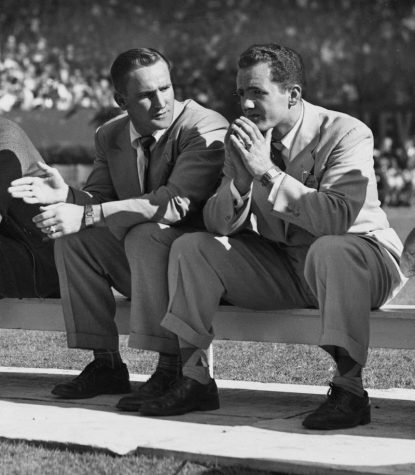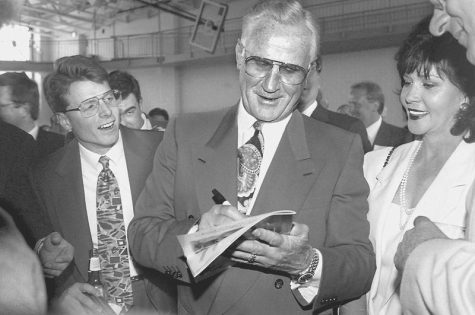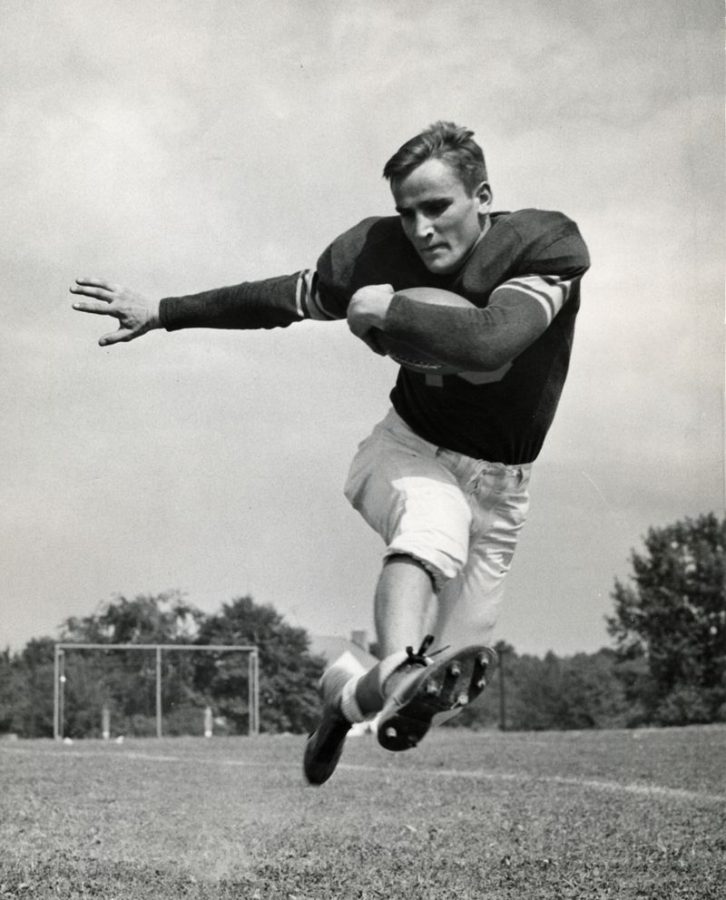Life After JCU — Don Shula
JCU Sports Information Department
Photo of John Carroll’s Don Shula from the Cleveland News
Oct 28, 2022
If you are a current student at John Carroll University or an alumni of the school, the odds that you have heard the name Don Shula at least once are extremely high.
This legendary NFL coach and JCU alumnus, class of 1951, has had a tremendous impact on John Carroll and the National Football League.
Shula continues to be held in the highest regard at JCU as the school honored his memory and life with the naming of Don Shula Stadium on Sept. 27, 2003, the arena where the Blue Streaks Football team competes each Saturday during the Fall season.
Shula passed away on May 4, 2020, but continues to be an icon of the Blue and Gold and a role model for his son David Shula, himself a former NFL head coach with the Cincinnati Bengals
“He was the same person at home as he was at work,” said son David Shula to The Carroll News. “I worked for him for six years (as an assistant coach) so I saw that first hand. He was a great example of a Catholic-Christian husband, father and person, let alone being the greatest NFL Coach.”
Shula came to John Carroll in the Fall of 1948 and immediately had an impact on the team.
By the time of his senior season in the Fall of 1950, Shula was “averaging 6.6 yards per carry, propelling him as an All-Big Four choice” in the running back position.
His success as a Blue Streak did not go unnoticed and his hometown NFL team, the Cleveland Browns, selected Shula in the ninth round of the 1951 NFL Draft as a defensive back.
Shula played in all 12 Browns’ games during the season of 1951 with his first starting appearance coming in October. The Browns–who were annually contending for the championship title each season during the most successful period in team history–finished with a record of 11-1 and went to the championships, but lost to the Los Angeles Rams 24-17. Shula recorded four interceptions during his rookie season.
Shula played in the NFL for seven more seasons, switching amongst the Baltimore Colts and Washington Redskins as he recorded 21 interceptions and four fumble recoveries in 73 appearances between these teams.
Shortly after he retired from this highest level of playing, Shula began coaching the sport he loved.
“He started at the University of Virginia as an assistant,” explained David Shula. “He loved the game and loved to teach it.”

Shula then went on to coach at the University of Kentucky, but after just one season, Shula returned to the NFL, this time as a defensive backfield coach for the Detroit Lions in 1960.
He coached there for three seasons, helping the Lions to two straight second-place finishes in the NFL West. He received his first head coaching job with the Baltimore Colts in 1963. The Colts were a powerhouse team behind the offensive heroics of star quarterback John Unitas. After an average first season (8-6), Shula propelled the Colts in the 1964 season to a 12-2 record in just his second year as a head coach.
After much success with the Colts and some rumors of conflicts with the Baltimore owner, Shula was hired by the Miami Dolphins, a team that had not won more than five games a season since the team’s founding in 1966.
Shula turned the whole team around.
In his 26 seasons with the Dolphins, he won consecutive Super Bowls in 1973 and 1974 and took six teams to this championship game—the record during his time of coaching. Under Shula, the Dolphins only experienced two losing seasons.
Shula originally came to Miami with a run-oriented attack, but, when his personnel dictated it, he became a pass-oriented coach, such as when he had Dan Marino as quarterback, which led to another Super Bowl appearance.
When asked what contributed to his father’s success as a coach, David Shula responded by saying, “His belief in doing things the right way. Not taking shortcuts. Pushing those around him to be their best beyond what they thought they could be. His competitiveness and willingness to tweak his system to highlight the strengths of his players. Hiring smart/talented coaches and letting them do their jobs without micromanaging.”
Probably one of the most unique games of his coaching career was when he coached against David and the Cincinnati Bengals.
On October 2, 1994, Don Shula’s Miami Dolphins defeated son David Shula’s Cincinnati Bengals by a 23–7 mark. Dubbed the “Shula Bowl,” it marked the first time in NFL history that a head coaching matchup featured father against son.
“Dad’s example of commitment to faith, family and leading a Christian life was very influential to me and my siblings,” said David, who is now the wide receivers coach at Dartmouth College. “I’ve tried to incorporate those same attributes.”
By his retirement in 1996, Shula was considered the winningest coach in NFL history with a 347-173-6 record in his 36-year coaching tenure. He coached in six Super Bowls, the most appearances of all-time for any coach. Shula went on to win Super Bowls VII and VIII. He remains the only head coach in NFL history to record a perfect season (17-0, 1972 Dolphins).
Shula earned more titles and awards even after his retirement.
In 1993, “Sports Illustrated” named him as their Sportsperson of the Year—the first professional coach to receive the honor—and just four short years later, Shula was inducted in the Pro Football Hall of Fame.

“The game teaches many great life lessons,” reflects David. “Being a team player. Putting others in front of yourself. Achieving team goals will bring individual recognition. Life is not always smooth. Handle the rough spots believing good times will result. Handling stressful situations with calm resoluteness.”
“He often spoke about how important his Jesuit based education was in his development,” continues Shula. “His financial support over the years reflects that.”
When asked if he believes his father helped to start the famous JCU connection to the NFL, David responded with “Yes, I believe he was the first to go to the NFL and opened the door for the rest.”
Don Shula will continue to impact John Carroll in the same way that the school impacted him, his teachings and coaching strategies. In his book “Everyone’s a Coach: Five Business Secrets For High-Performance Coaching”, Shula makes the powerful statement: “I don’t know any other way to lead but by example.”













